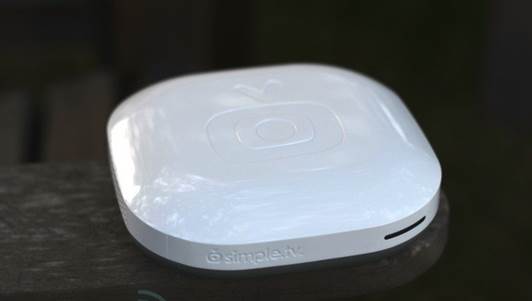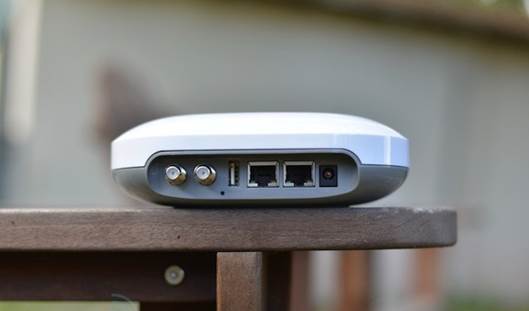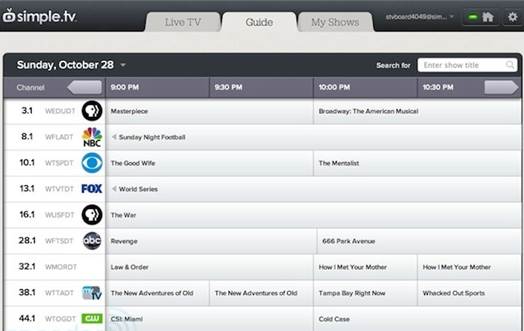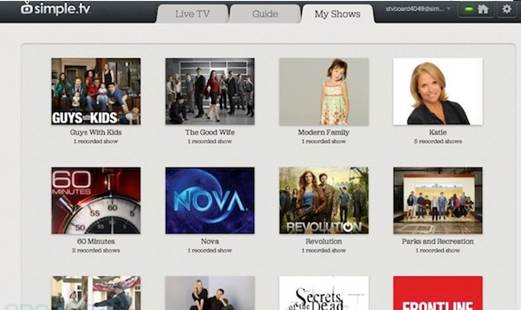Anyone who closely follows the home
entertainment sector certainly agrees that TV is broken: antiquated user
interfaces, expensive packages, 6 remotes that each does one thing, all are
limited within your home. Of course, realizing that it is broken and knowing
how to fix it are two different things. An attempt to repair is Simple.TV. This
$149 box (with 59 dollars/years of service) bridges the gap between many
available devices that you have already owned and the TV world. It allows you
to access a lot of contents via encrypted digital cable, or for free via
antenna, on almost any devices you own - tablet, smartphone, PC or even TV. It
sounds quite great, right? But can it do that? And can it replace the cable box
and expensive service coming with it? Keep reading and you will know.

Simple.TV
The big picture
Some things in life require further
explanation, and of course Simple.TV is one of them. The best way we can
describe it is this: it is the TV tuner networking with the option storage for
your mobile devices. In other words, it does not do anything by itself. A
typical system will include a Simple.TV, an external hard drive, a tablet or
PC, and 1 Roku connected to the TV. (The supporting for additional devices will
soon come later, the representatives of Simple.TV said). It is like the
Slingbox but with fewer inputs and no intelligence needed to control a cable or
satellite set- top box. But it can record.

A
typical system
Hardware
Simple.TV is a glossy white device which
has oddly strange shape in any home theater - it reminds us of a wireless point
that you will find attached to the ceiling in the workplace, except for that it
is much lighter and with lower quality plastic. The good news is that you
certainly will not put it in the home theater, instead of that; you can connect
it where the cable modem or internet enters your home. That is because the
device requires a coaxial cable and network connection. The coaxial cable needs
to be connected to the cable supplier line or to an antenna. There are 2
coaxial cables and 2 network connections at the back that thread through to
make it easier to sort them. Finally, there is one USB port for attaching an
external hard drives (many hard drives will need hubs) to help you storing your
records - there is no internal storage option.

Simple.TV
with its 2 coaxial cables and 2 network connections
Inside, you will find an unique tuner
having capable of transmitting live TV or recording programs, while allowing 5
devices to transmit similar programs, or 5 different previously recorded
programs. As you may have noticed, there is no audio or video output. That's
because the Simple.TV depends on the others to render the signals that it
regulates. Another notable omission: Wi-Fi. However, you should not remember
it, because this is a stationary box that can live anywhere in your home, as
long as it is connected to a wired network. There are two LED lights, one on
the corner that lights red, blue or purple depending on the device state
(booting, recording, etc.) and a blue one in front to indicate power source.
None of them causes distraction, which is a good thing because there is no way
to adjust the brightness or disable them.
Software

Simple.TV
software
When talking about software, we are really
referring to one web application and the Roku channel. There is no application
for iOS, Android or desktop - but we know they are coming. You just point your
browser to www.simple.tv and login - and there is not even an optimized version
for mobile browsers. If you sign up for the premium service with 59 dollars/
year, or choose to register for a lifetime, you can watch TV anywhere you have
an internet connection. Without it, your 5 concurrent connections are limited
within your home network range. The experience is divided between 3 tabs: Live
TV, Guide and My Shows. Live TV is the first thing you see when you browse to a
page, but there is no way to set up another default or bookmark your favorite
programs.
The Live TV reveals a simple channel list,
showing what is happening and if there are any programs that is currently being
recorded. From here, you choose to learn more about the program and have quick
access to see it live, record that episode or record all the episodes which
will air. The streaming experience is like experience of most of embedded webs
videos with the ability to view full screen and jump forward or back, but there
is no way to get rid of the browser window or change the channel quickly. We
find it strange that while the video is provided via HLML5 on iOS devices, on
Mac or PC, Silverlight is the technology base - new computers handles it
easily, but the 4 year- old computer we tried did not work well.
The Guide tab reveals the typical network's
broadcast schedule with a search box, which you will use to schedule recordings
- if you see something interesting broadcasting live, you will need to go back
to Live TV tab see it. So you need to pay for premium service to receive
broadcast schedule data, this tab is not very useful if you do not pay. These
necessary indicators are present to let you know what has been scheduled to
record. There is a drop- down menu which is easy to access to select up to 5
days in advance, but there is no easy way to choose a particular day and time.
Whether searching or browsing, the UI shows to be slower than we like, but the
temporary delay when the screen updates is not useless. Once you choose
something, you will get additional details about the program, as well as
options to record a single episode or all episodes in the series.

The
Guide tab
The last tab is My Shows, which presents
your recordings in brick-form layout. Clicking on the image will show which
episodes are available to view, and provides the easy access to see what is
coming soon. From here, you can delete recordings one by one or all at once and
delete recording series. The My Shows experience is faster than the guide, and
looks more modern thanks to its artistic presentation. However, the missing
thing is a general list or any sorting options.

My
Shows tab
In addition to the three main tabs, there
are some setting menus for things like deleting recording series - there is no
way to change their priority as well as seeing what will be recorded. The other
options in settings include the ability to check how much spaces on the
external hard drive is available to write more and the ability to record
earlier or later than 1 minute. The only available guide options allow you to
select which channels appear and start scanning for channels - this took about
20 minutes for an OTA scan. Finally, you can control which devices are
connected to the Simple.TV, but at this time it only lets you adding or
removing the Roku.